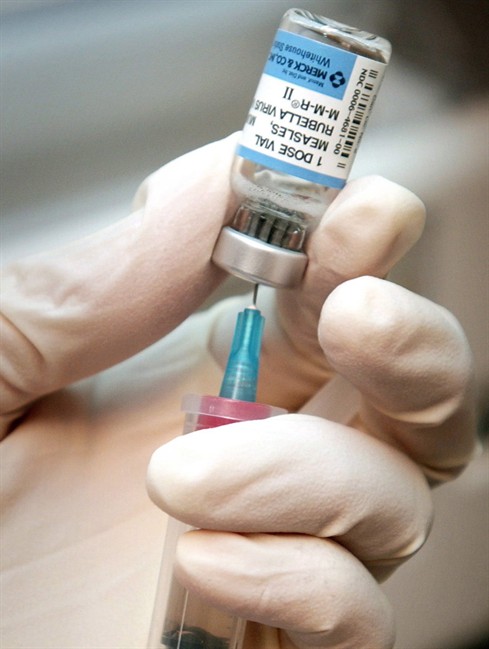Albertans are being warned a mumps outbreak in southern Alberta could spread to the rest of the province after nine cases were confirmed.

The warning came after exposure to the virus was discovered through the Western Hockey League’s Medicine Hat Tigers.
READ MORE: Why the NHL locker room is the perfect catalyst for a mumps outbreak
There is important information you should know to avoid getting the virus and managing it if you do.
What is Mumps?
Mumps is a contagious viral infection that can cause painful swelling of the salivary glands, especially the parotid glands.
It usually goes away in about 10 days, but, in some cases, it can cause complications that affect the brain, the testicles, the ovaries, or the pancreas.
What vaccination should I get?
The good news is there is a mumps vaccine that protects against the illness. The vaccine is part of the MMR (measles, mumps, and rubella) and MMRV (measles, mumps, rubella, and chickenpox) vaccines.
Most children get the vaccine as part of their regular shots.
“In Alberta, we recommend two doses of mumps-containing vaccine,” Alberta Health Services (AHS) medical officer of health Dr. Judy MacDonald said.
“First dose given at 12 months of age and the second one just before starting school.”
MacDonald said adults who haven’t been immunized can still get the vaccine.
What causes mumps?
The illness is spread through spit contact, such as sharing food or drinks, or when an infected person coughs or sneezes near you.
“Mumps can be spread easily,” said Dr. Chris Sikora, medical officer of health with AHS. “There is a number of different ways that it is spread, one is through contact. So if we touch infected items and then touch our nose and mouth and eyes we can contract illness that way very much like influenza.
“Mumps is also spread by droplet means, so when people cough or share things like water bottles or glasses or dinnerware for that matter.”
The virus can spread seven days before and nine days after symptoms start. Mumps is most likely spread one or two days before and five days after symptoms start.
MacDonald said athletes on sports teams are more susceptible to getting the virus.
“For sports teams, we do try to get the message out repeatedly: use your own water bottle. Don’t be sharing spit because mumps is one disease that can be spread that way, amongst others.”
What are the symptoms?
Symptoms can include:
- Swelling and pain in the jaw
- Fever
- Headache, earache, sore throat, and pain when you swallow or open your mouth
- Tiredness, with aching in the muscles and joints
- Poor appetite and vomiting
It typically takes two to three weeks to get mumps’ symptoms after you’ve been exposed, although some people who are infected with the virus don’t get symptoms.
“In some cases, as many as three out of 10 cases, there can be swelling of testicles – orchitis – and in some very unusual or rare circumstances, like less than one in 1,000, people can have difficulty like pancreatitis, meningitis, and/or much more serious concerns,” Sikora said.
How is mumps diagnosed?
Mumps is usually diagnosed based on symptoms and a history of exposure to the illness. A blood test can also be performed to find out if a person has mumps.
Additionally, the virus can be identified using a sample of urine, saliva, or cerebrospinal fluid, but these tests are rare.
How is it treated?
The majority of people exposed to the virus simply require rest and care at home.
If you get mumps, take medicine to help relieve fever or headache as required, use ice or a heat pack on swollen areas, drink additional fluids to reduce fever and prevent dehydration, and suck on ice chips or flavoured ice pops and eat soft foods that don’t require chewing.
It’s recommended that people with mumps stay out of public places five to nine days after salivary glands first started to swell.
“Stay home if you’re sick,” Sikora said. “With mumps specifically, if people do have illness that’s consistent with mumps, which would be the swelling of the glands and the jaw, stay home until you’re better which may mean at least five to six days.”
Why is it important to prevent mumps?
Vaccinating your child is important because mumps has the potential of causing serious problems and is a contagious disease that can cause outbreaks.



Comments